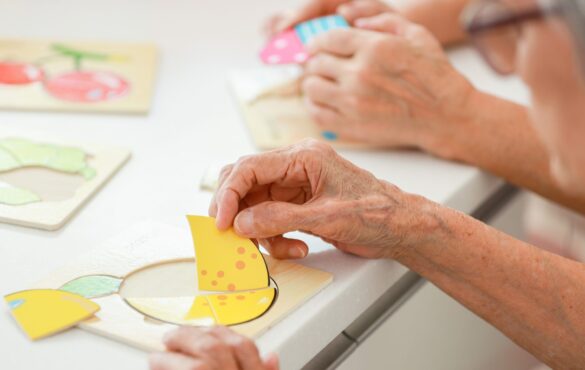Caring for a person who has dementia is a huge responsibility involving understanding, patience and being able to implement effective strategies. Here at Caring Hands, we specialise in providing tailored dementia care, suited to the individual’s needs.
In our blog on how to care for someone with dementia, we will be discussing practical tips and insights on how best to care for someone who has dementia, utilising our extensive experience and knowledge best we can. Whether you’re a professional, caregiver or a family member, these guidelines are there to ensure both the well-being and the comfort of those under your care.
1. Understanding Dementia
Dementia is an umbrella term for many cognitive impairments that can interfere with a person’s daily life. Being able to understand the specific condition affecting your loved one will help you to further tailor your approach to the way you care for them. Our Alzheimer’s and Dementia Support Services have been designed to address the needs of every individual, as every case is unique, providing support and guidance through every stage of their condition.
2. Creating a Safe and Supportive Environment
Comfort and safety are of the utmost importance for someone with dementia. Creating an optimal living environment consists of the below 3 things:
- Minimise Hazards: Removing any potential hazards, such as loose rugs, sharp objects, or any clutter around that could cause a potential fall.
- Use Clear, Concise Labels: Making sure cabinets, doors, and drawers are labelled clearly will help the person to be able to navigate their surroundings much easier.
- Enhance Lighting: Ensuring that all areas around the house are well-lit to help reduce confusion and this in turn prevents accidents in the home.
3. Establishing and Maintaining Routine
Learning how to care for someone with dementia is learning that a solid, consistent routine can help to significantly benefit those who have dementia. Routine can reduce anxiety and agitation through providing structure to someone’s day. By incorporating regular times for activities, rest and meals can also help to ease the anxiety someone with dementia may feel on a daily basis. Routine is there to help create a sense of stability and predictability, which is so important for those who suffer with cognitive impairments.
4. Effective Communication Techniques
Communicating with someone who has dementia often requires a certain level of patience and clarity. Below are 3 ways to help provide effective communication techniques:
- Speak Slowly and Clearly: Using short sentences and simple language can help to make communication much easier and a lot more effective for both parties.
- Use Non-Verbal Cues: Facial expressions, visual aids and gestures can further support any verbal communication.
- Stay Calm and Reassuring: Making sure you maintain a calm tone and offer reassurance can significantly help reduce both stress and confusion.
5. Encouraging Independence and Engagement
Providing support for those with dementia is essential, but so is encouraging independence as this can help to maintain a person’s autonomy as well as their self-esteem. Learning how to care for someone with dementia is allowing them to participate in daily activities such as setting the table, or even simply dressing themselves can also be really helpful.
It can also help to engage them in meaningful activities that they can both manage and enjoy, which can help to keep their mind active and also engaged throughout.
6. Managing Behavioural Changes
A common aspect of dementia is behavioural changes in the person, here’s a list of 3 ways to manage them effectively:
- Stay Patient: It is important to understand that changes in a person’s behaviour may be due to frustration or confusion, which is why it is important to approach these sorts of challenging behaviours with patience and empathy.
- Identify Triggers: It can help to observe and identify what may trigger certain behaviours and to then try to mitigate or address these triggers, to prevent them from becoming an issue.
- Offer Comfort: Sometimes, even the simplest gesture of comfort, such as holding their hand or even a hug, can provide that reassurance and calm that they need.
7. Providing Proper Nutrition and Health Care
It is crucial for a person’s overall health and well-being that proper nutrition is part of their everyday routine. Ensuring that the person with dementia has access to a healthy, balanced diet is also important, as well as being mindful of any changes in their eating habits. Including regular health check-ups is crucial as well as managing any other medical conditions they also have is another important aspect of care.
8. Seeking Professional Support
Professional support for those who are learning how to care for someone with dementia can be invaluable. At Caring Hands, we understand this, which is why we offer specialised care services which includes supporting caregivers and also care plans tailored to your loved ones’ needs. Seeking some form of professional help can provide that additional support and also help to relieve some of the burdens that a family caregiver may feel.
9. Taking Care of Yourself
It is important to acknowledge that caring for someone with dementia can be both emotionally and physically demanding, and it’s okay to admit that. It is so important that you take care of your own well-being, and where possible seek support through caregiver groups; talking to people going through the same thing as you can be a real help. Making sure you take regular breaks when you need to are also important, as well as considering respite care options to avoid burnout.
Compassion, patience and a thoughtful approach is required when you are on the journey that is caring for someone with dementia. By not only understanding the condition, but also utilising effective communication and care strategies, as well as creating a supportive environment, you are able to significantly enhance the quality of life for those around you with dementia.
At Caring Hands, we are committed to not only supporting caregivers and individuals, but also giving them the tools on how to care for someone with dementia through every step of this journey. For more information on our Alzheimer’s and dementia care services, or any of the other services we provide, visit out website or contact us directly.


